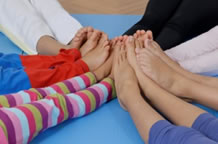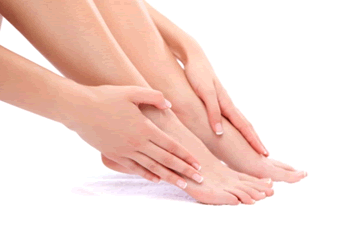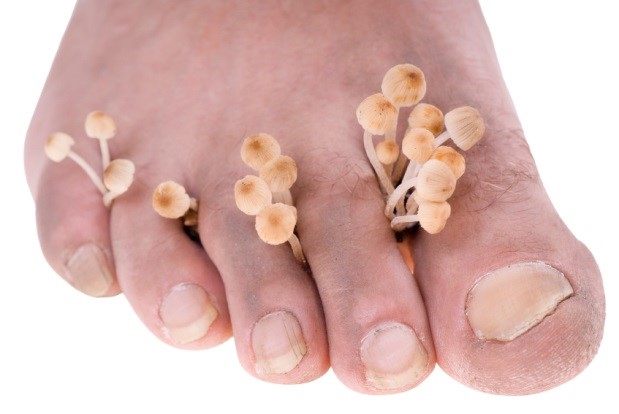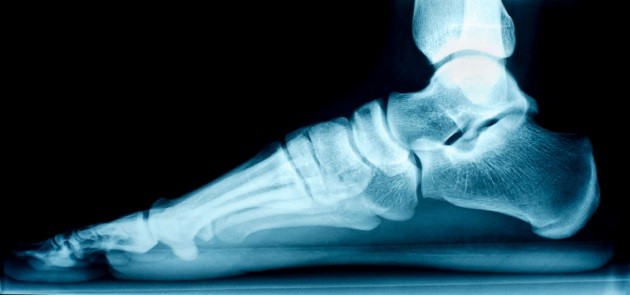Blog
Tips for Comfortable Feet
 Aching feet can be very troublesome and distracting while on the job. Fortunately, there are some tips you can use to make your feet more comfortable. The first tip is to buy your shoes in the afternoon, because that is when feet swell the most. There should be about one centimeter of space between your longest toe and the end of the shoe. Another tip is to make sure your feet are moisturized. However, you should avoid putting moisturizer between your toes, because that may lead to athlete’s foot. Lastly, you should not ignore pain in your feet. If you are experiencing a constant pain that will not go away, you should go see a podiatrist for help.
Aching feet can be very troublesome and distracting while on the job. Fortunately, there are some tips you can use to make your feet more comfortable. The first tip is to buy your shoes in the afternoon, because that is when feet swell the most. There should be about one centimeter of space between your longest toe and the end of the shoe. Another tip is to make sure your feet are moisturized. However, you should avoid putting moisturizer between your toes, because that may lead to athlete’s foot. Lastly, you should not ignore pain in your feet. If you are experiencing a constant pain that will not go away, you should go see a podiatrist for help.
Every day foot care is very important to prevent infection and other foot ailments. If you need your feet checkedcontact Dr. Michael E. Newman of Pennsylvania. Our doctor can provide the care you need to keep you pain-free and on your feet.
Every Day Foot Care
Often, people take care of their bodies, face and hair more so than they do for their feet. But the feet are a very important aspect of our bodies, and one that we should pay more attention to. After all, without our feet, we would not be able to perform most daily tasks. It is best to check your feet regularly to make sure there are no new bruises or cuts that you may not have noticed before, for example.
For dry feet, moisturizer can easily be a remedy and can be applied as often as necessary to the affected areas. Wearing shoes that fit well can also help you maintain good foot health, as well as making it easier to walk and do daily activities without the stress or pain of ill-fitting shoes, high heels, or even flip flops.
Also, wearing clean socks with closed shoes is important to ensure that sweat and bacteria do not accumulate within the shoe. Clean socks help to prevent athlete’s foot, fungi problems, bad odors, and can absorb sweat.
If you have any questions please feel free to contact one of our offices located in Plymouth Meeting and Ambler, PA. We offer the newest diagnostic and treatment technologies for all your foot and ankle needs.
Corn Removal Should Be Done by Podiatrist
 Two common podiatric problems that doctors and nurses encounter are calluses and corns. Calluses form in response to repeated pressure and friction on the skin. Corns form as a result of the same factors but usually on bony areas such as the joints. Corns can become painful and infected, so it’s important that the removal of corns is performed by your podiatrist.
Two common podiatric problems that doctors and nurses encounter are calluses and corns. Calluses form in response to repeated pressure and friction on the skin. Corns form as a result of the same factors but usually on bony areas such as the joints. Corns can become painful and infected, so it’s important that the removal of corns is performed by your podiatrist.
If you have any concerns regarding your feet and ankles, contact Dr. Michael E. Newman of Pennsylvania. Our doctor can provide the podiatric treatment you seek.
Corns: What are they? And how do you get rid of them?
Corns can be described as areas of the skin that have thickened to the point of becoming painful or irritating. They are often layers and layers of the skin that have become dry and rough, and are normally smaller than calluses.
Ways to Prevent Corns
There are many ways to get rid of painful corns such as wearing:
- Well-fitting socks
- Comfortable shoes that are not tight around your foot
- Shoes that offer support
Treating Corns
Treatment of corns involves removing the dead skin that has built up in the specific area of the foot. Salicylic acid can help in getting rid of these corns because it dissolves keratin, which is the protein that makes up a good majority of corns. Podiatrists recommend that people with diabetes not use salicylic acid but should consult with their podiatrist regarding the treatment of corns.
If you have any questions please feel free to contact one of our offices located in Plymouth Meeting and Ambler, PA. We offer the newest diagnostic and treatment technologies for all your foot and ankle needs.
Dealing with Toenail Fungus
 A toenail fungus is a very common condition that can be painful if it spreads. Certain factors may make a person’s fungus more likely to spread. These factors include: having a weak immune system, abnormal pH levels of skin, diabetes, and poor hygiene. Fortunately, there are some treatments available for toenail fungus. Baking soda has been proven to be an effective treatment for toenail fungus. When baking soda and borax are mixed together they create a paste that can be used to treat the fungus. Another option for treatment is orange oil. Orange oil is completely natural and anti-fungal. However it should be tested on a small area of skin prior to being used for treatment, in order to ensure that you are not allergic to it.
A toenail fungus is a very common condition that can be painful if it spreads. Certain factors may make a person’s fungus more likely to spread. These factors include: having a weak immune system, abnormal pH levels of skin, diabetes, and poor hygiene. Fortunately, there are some treatments available for toenail fungus. Baking soda has been proven to be an effective treatment for toenail fungus. When baking soda and borax are mixed together they create a paste that can be used to treat the fungus. Another option for treatment is orange oil. Orange oil is completely natural and anti-fungal. However it should be tested on a small area of skin prior to being used for treatment, in order to ensure that you are not allergic to it.
For more information about treatment, contact Dr. Michael E. Newman of Pennsylvania. Our doctor will attend to your foot and ankle needs.
Toenail Fungus Treatment
Toenail fungus is a problem which affects many people and is hard to get rid of. Fortunately, there are several methods to go about treating toenail fungus.
Antibiotics & Treatments
Lamisil – is the most commonly effective treatment for toenail fungus. It is available as an antibiotic Terbinafine tablet and cream. Terbinafine is a chemical component which kills fungal growth on the body. Applying regular doses will gradually kill the fungal growth. It is important to keep the area clean and air free.
Talcum powder – applying powder on the feet and shoes helps keep the feet free of moisture and sweat.
Sandals or open toed shoes – wearing these will allow air movement and help keep feet dry. They also expose your feet to light, which fungus cannot tolerate. Socks with moisture wicking material also help as well
Alternative Treatments
There are always surgical procedures that are available for toenail fungus. Some people would like immediate quick removal of toenail fungus. Surgeons will be able to cut through and remove the growth using laser surgery. It is important not to try and remove it yourself. Once removed, your old shoes will need to be replaced to avoid reinfection.
If you have any questions please feel free to contact one of our offices located in Plymouth Meeting and Ambler, PA. We offer the newest diagnostic and treatment technologies for all your foot and ankle needs.
Living with Flat Feet
 People with pes planus, or flat feet, have a flattening of the arch in their foot. Flat foot is normal in young children and infants. Fortunately, the foot usually corrects itself as muscles strengthen and soft tissues stiffen. However, flat foot does not always go away for some people. People who have flat feet have to deal with the pain and disability that it causes for the rest of their lives. Flat feet only need to be treated if they cause severe pain in those who have them.
People with pes planus, or flat feet, have a flattening of the arch in their foot. Flat foot is normal in young children and infants. Fortunately, the foot usually corrects itself as muscles strengthen and soft tissues stiffen. However, flat foot does not always go away for some people. People who have flat feet have to deal with the pain and disability that it causes for the rest of their lives. Flat feet only need to be treated if they cause severe pain in those who have them.
Every day foot care is very important, especially for those that are lacking the proper foot care resources. For more information about everyday foot care, contact Dr. Michael E. Newman of Pennsylvania. Our doctor will assist you with all of your podiatric concerns.
What are Flat Feet?
Flat feet are a condition in which the arch of the foot is depressed and the sole of the foot is almost completely in contact with the ground. Standing about 20-30% of the population generally has flat feet because their arch never formed during growth.
Conditions & Problems:
Having flat feet makes it difficult to run or walk because of the stress placed on the ankles.
Alignment – The general alignment of your legs can be disrupted, because the ankles move inward which can cause major discomfort.
Knees – if you have complications with your knees, flat feet can be a contributor to arthritis in that area.
Symptoms:
Pain around the heel or arch area
Trouble standing on the tip toe.
Swelling around the inside of the ankle.
Flat look to one or both feet.
Having your shoes feel uneven when worn
Treatment:
If you are experiencing pain and stress on the foot you may weaken the posterior tibial tendon, which runs around the inside of the ankle.
If you have any questions please feel free to contact our office located in Plymouth Meeting and Ambler, PA. We offer the newest diagnostic and treatment technologies for all your foot and ankle needs.
